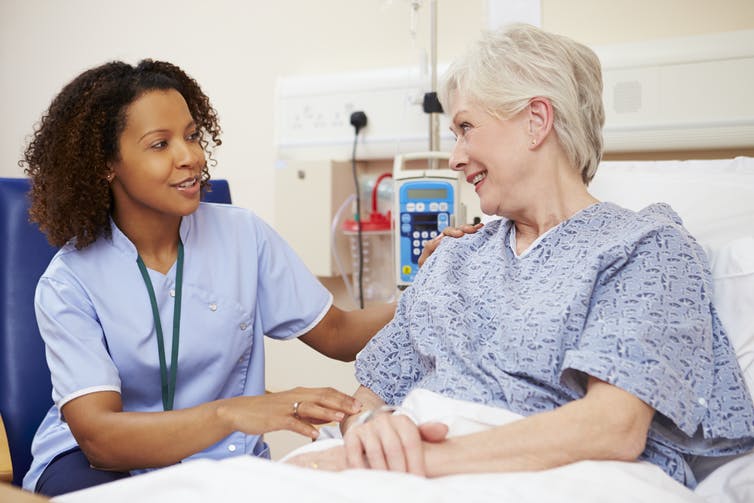
The COVID-19 pandemic has resulted in an unprecedented interest in science, as people everywhere were faced with making decisions that affected their health. These included decisions such as following public health protective measures, getting vaccinations and accessing health-care services.
All of this has taken place in rapidly evolving, uncertain environments. The events related to the COVID-19 pandemic have highlighted the importance of what constitutes credible information or evidence (research-based information) and how evidence is communicated and used to make decisions. At the start of the pandemic, little was known about COVID-19, and making health decisions was a challenge.
The ongoing pandemic has given rise to what is characterized as an “infodemic” due to the sheer quantity of information available, including the rapid spread of misinformation or fake science reporting. From media outlets reporting in a 24/7 news cycle to the reliance on social media influencers, in many instances with a strong editorial bias, the information environment is bewildering and difficult to navigate.
The amount of information can pose daunting challenges to those who are seeking information to make informed health-care decisions. For example, misinformation has been found to negatively affect people’s willingness to get vaccinated and can lead to risky behaviours.
Making decisions that impact health has been a nearly universal experience during the pandemic: it affected everyone. Often these decisions were made without support from health-care providers. Our health systems have been challenged to better support people to make health-care decisions, such as exploring options to determine how to support informed, values-based COVID-19 vaccination decisions.
We are members of an interdisciplinary, international team of patient partners, health-care providers, educators and researchers that include the perspectives of patients in a leadership capacity. We have been seeking to understand and advance an approach to preparing patients for health decisions called shared decision-making.
Support for people to take charge of their health
“Shared decision-making” is when a person experiencing a health issue works together with their health-care providers to make decisions about screening, treatments or managing chronic conditions. Shared decision-making upholds person-centred care and supports people to take an active role in their health-care decisions.
Standard care provides patients with evidence-based information about health choices. However, with shared decision-making, the person’s individual preferences, beliefs and values are considered in making health decisions, as well as clinical evidence.

(Shutterstock)
Importantly, shared decision-making is a process that supports people to understand the risks and benefits of different options through discussion and information sharing with their health-care providers.
In fact, shared decision-making has been called “the pinnacle” of person-centred care. A key feature of shared decision-making is the exploration of patient values and priorities and it can be facilitated by using evidence-based decision support tools and approaches.
Decision coaching
Patient decision aids and decision coaching support people to have an active role in making decisions. Decision aids include booklets, videos and online tools that make the decision clear, provide options and the pros and cons, and help people clarify what matters to them.
They may be used by patients alone or in consultation with a health-care provider. They have been shown to help people feel more knowledgeable, better informed and clearer about their values. In addition, people probably have a more active role in decision-making and more accurate risk perception.
Our team viewed it as important to determine the unique contribution of decision coaching, an intervention with strong potential to help people prepare for health-care decisions. Decision coaching is delivered by trained health-care providers to support people facing decisions, with or without the use of an evidence-based tool (such as a patient decision aid).
We conducted a systematic review to assess the effects of decision coaching. The review included 28 studies that covered a range of medical conditions with treatment and screening decisions.
While further research is needed on many outcomes, we found that decision coaching may improve participants’ knowledge (related to their condition, options, outcomes, personal values, preferences) when used with evidence-based information. Our findings do not indicate any significant adverse effects (for example, decision regret, anxiety) with the use of decision coaching.
Although we began our systematic review before the COVID-19 pandemic, our exploration of decision coaching is even more relevant given the decision demands of the pandemic and accompanying difficulty of the decisions.
Experiences with the COVID-19 pandemic have shown that, in rapidly changing complex health-care environments, strategies that uphold person-oriented health care are critical. Shared decision-making tools and approaches, ideally using decision aids and decision coaching, can contribute to shaping person-centred health-care services that puts people first and upholds the principle of “no decision about me, without me.” To make the best health decisions for themselves and their families, people need support and opportunities to work with trusted health-care providers.
Maureen Smith, chair of the Cochrane Consumer Network Executive, co-authored this article.
![]()
Janet Jull has received funding from the Canadian Institutes of Health Research and Ontario Institute for Cancer Research to conduct studies about shared decision making and decision coaching.
Dawn Stacey receives funding from the Canadian Institutes of Health Research and the Canadian Cancer Society to conduct studies about decision coaching.
Sascha Köpke receives funding from German Ministry of Research & Education, German Ministry of Health, German Innovation Fund (federal funding), German Statuary Health Insurance ("Techniker Krankenkasse").























